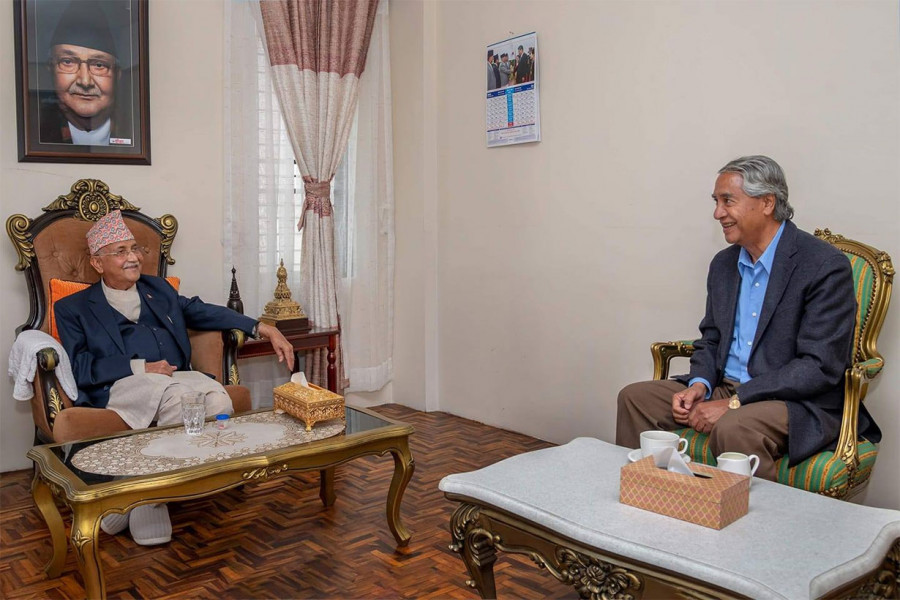Columns
The elusive no-confidence motion
What are the options to replace Oli and restore sanity in Nepal’s politics?
Naresh Koirala
It has been almost six weeks since the Supreme Court restored Parliament. Had Prime Minister KP Sharma Oli followed the universally accepted ethical boundaries of democratic politics, we would have had a new prime minister by now. Oli would have resigned soon after the court's ruling. But our politicians have never allowed ethics to frustrate their lust for power and money. Oli is no different. Predictably, he did not step down. Instead, he is taunting his opponents to defeat him in a no-confidence motion in Parliament. ‘If I am defeated, I will resign,’ he says, as if the defeat in court meant nothing.
Pushpa Kamal Dahal and Madhav Kumar Nepal, Oli’s nemeses in the erstwhile Nepal Communist Party, spent the last year trying to rein in Oli. The Nepal Communist Party was formed about three years ago by merging the CPN-UML led by Oli and the Communist Party of Nepal (Maoist Centre) led by Dahal. Oli and Dahal had initiated the merger. They celebrated the union as the 'greatest communist unity in the world'. In less than two years, the much-vaunted unity started to unravel. Factional fights driven by the egos and competitive ambitions of the party leaders erupted with Oli on one side and the duo of Dahal and Nepal on the other. When it looked like he was losing ground, Oli dissolved Parliament to avert a threatened no-confidence motion from the rival camp. Nepal’s constitution became a hostage to Oli’s wily ways.
Back to mother parties
The dissolution of the House riled Oli’s opponents in the Nepal Communist Party and the opposition parties. The Supreme Court ruled the dissolution unconstitutional and ordered its reinstatement. Less than a month later, ruling on a case that questioned the legitimacy of the Nepal Communist Party, the court voided it and ordered its members to go back to their mother parties. Nepal and his followers returned to the UML, still headed by their nemesis Oli. Dahal was back as the head of the Maoist Centre; his minions followed.
One would have thought that, upon reinstatement of Parliament, the Dahal-Nepal group would rush to register a no-confidence motion. Yet, that is not happening. What is holding them from tabling the motion? What are the options to replace Oli and restore sanity in Nepal’s politics? For the motion to secure a majority vote in Parliament, it will have to be supported by the second-largest party, Nepali Congress, and at least one smaller party. And this is not all. According to the constitution, the next prime minister must be named in the no-confidence motion.
The UML leaders who had opposed Oli when they were in the Nepal Communist Party appear to be running away from the idea of a no-confidence vote, because, they argue, this will formally break the UML. This is a ruse to protect themselves from being expelled from the party by Oli. Should that happen, they will lose their seat in Parliament and the power and privileges it brings. Dahal is on his own when it comes to moving the no-confidence motion.
Judging from the makeup of Parliament, Nepali Congress leader Sher Bahadur Deuba is the most likely candidate for the next prime minister. Dahal had made overtures to Deuba for an alliance. According to reports, Deuba was non-committal. This was about three weeks ago. Deuba’s reluctance is understandable. He knows Dahal cannot be trusted. He was conspiring with Oli to form the Nepal Communist Party when the Maoist Centre was still the Nepali Congress’ coalition partner in government; after the formation of the Nepal Communist Party, he started conspiring with Nepal against Oli; going further back, when the king abdicated and the country was declared a republic, in his own words, he reneged on his promise to support Girija Koirala to become president. I could go on. He is allegedly one of the most corrupt politicians in the country. Nepali Congress will have a lot of explaining to do if it forms a government with the Maoists.
For the last 70 years, Congress has led every major change and managed every major crisis in the country. It led to the 1950 revolution and ushered in democratic polity in the country. It fought the king's dictatorship for 30 years and drove the multi-party alliance that restored democracy. It fought the Maoist insurgency, initiated the negotiations with the Maoists, and convinced them to give up violence and accept multiparty democracy. It will be irresponsible for Congress to be indifferent to the current state of the country and let Oli continue as prime minister. Oli's administration is not only one of the most corrupt Nepal has ever seen, but the events of the last three years have shown that Oli will go to any length to stay in power, even to the extent of tampering with the constitution.
Agenda-based agreement
Recent reports suggest Deuba is warming up to working with the Maoists. Unless Oli allies with smaller parties to upend the no-confidence motion or if he continues to stymie the House to force an early election, a no-confidence motion with Deuba as prime minister may hit the halls of Parliament soon. Two questions arise. How should the new Congress-Maoist dispensation look like, and is Deuba capable of providing the leadership the country demands? There is no ideological congruence between the Congress and the Maoists. Add to the series of Dahal’s past betrayals. This should rule out sharing the government with the Maoists in any shape or form.
However, Congress could have an anti-corruption and developments-based agreement with the Maoists and form a single-party minority government, with the Maoists acting as their supporters outside the government. Single party minority governments are fairly common in Canada. Our constitution also allows them as long as the Prime Minister has the confidence of the house.
Nepali Congress should not delude itself into thinking its ascent to power will earn it the people's trust. It is a party in disarray, and its performance as official opposition has been more than dismal. Deuba’s past performance as prime minister was less than inspiring. His leadership comes with a huge baggage of incompetence and failures. If Congress forms the government, managing Deuba and earning the people’s trust will be the party central committee's challenge.




 13.12°C Kathmandu
13.12°C Kathmandu















